- Home
- David Pilling
The Heretic Page 2
The Heretic Read online
Page 2
Sigismund, I knew, was King of Germany and Hungary, titular King of Bohemia and darling of the Pope, who largely owed his position to the King’s influence. It was Sigismund who lured Jan Hus to the Council of Constance on false pretences, Sigismund who tore up Hus’ safe-conduct and had the preacher consigned to the flames.
It was also Sigismund who, as the self-appointed champion of the Catholic church, had invaded Bohemia the previous summer at the head of a vast army of crusaders. I had heard something of his defeat, though few of the details.
My archers, half-drunk as they were, laughed at Hugh’s careless blasphemy. I found it amusing myself, though Ralf was pale and silent.
“What happened?” I asked, leaning over the filthy table, “why did the siege fail? You had the advantage of numbers, did you not?”
“Numbers,” sneered Hugh, “numbers count for fuck-all unless you know how to make them count. Sigismund threw his men at Prague like a madman hurling shit at a wall.”
“Here,” he added, tearing up a hunk of bread, “let me show you what happened at Vitkov Hill. A farce for the ages, my dears! The stink of it will linger in German nostrils until the end of time.”
He described, with strange relish for one who had been on the losing side, how the garrison of Prague repelled the armed might of Christendom.
“Zizka’s strong point was at Vitkov Hill, on the edge of the city,” he said, slapping a lump of bread in the middle of the table, “the heretics built a wooden fort on the hill, strengthened by a lesser wall of stone and clay and defended by a deep moat. There was also a chain of block-houses, where they placed their cannon.”
“That blasted hill,” he mused, picking at a greenish tooth, “so long as they held it, we couldn’t get near Prague, or prevent supplies getting into the city. Whoever held the hill controlled the roads, you see.”
“The oaf Sigismund sent eight thousand men plodding up the hill to try and storm the block-houses. I was among them, God help me. We were shot to pieces on the way up. Those of us that reached the summit found a pack of lunatics waiting for us, with no fear of death in them. One of the block-houses was defended by a handful of serfs, including two wenches and a little girl. A child! Yet they fought like mad dogs.”
He tapped a long white scar on his hairy cheek. “See this? It was given to me by one of the women, an ugly slattern with a great boil on her neck. She jabbed at me with her club. Vicious long thing, it was, with iron spikes screwed into the head. All the while she screamed and spat at us, called us Antichrist, and vowed that no true Christian ran before the servants of the Devil. I lost patience and brained her with my halberd.”
“The attack failed?” I asked when he paused to lubricate his throat with another long swallow of wine.
“Yes, it failed,” he went on, “Zizka took us in flank, at the head of a great mob of screeching peasants armed with flails and spiked war-clubs and all manner of butcher's tools. I heard church bells sound inside the city, summoning the citizens to arms. They piled into us as well, led by a band of priests - priests! - carrying the Sacrament.”
Hugh puffed out his fallen cheeks. “There was no holding them. We were sent hurtling back down the slopes of the Vitkov, and I damn near drowned in the river at the bottom. The Vltava, I think its called. A burly great Switzer I owed money to hauled me out by the neck. Many of my comrades were not so lucky.”
“Three hundred Hungarian knights were slain in the rout. God knows how many commoners died. Sigismund gave up and ran off east with his tail between his legs. Most of his mercenaries had already deserted him. I only stayed long enough to collect my wages from a dog-faced swine of a quartermaster. He claimed no money was owed, so I cut him until his memory returned.”
There was a pause, while he noisily sucked down the dregs of his flask and snapped his fingers at a harlot for another.
“If the war is over,” I asked, “why are there so many soldiers in Stuttgart? Why do they linger in Germany?”
Hugh flapped a hand at me. “Oh, there’s always work for fighting men in Germany, lad. The Germans are a bloodthirsty race, almost as bad as we English. Their princes are forever waging private wars on each other, and there will be another crusade against Bohemia.”
“Another crusade?”
“Of course. Sigismund is the laughing stock of Christendom. He has to mend his reputation. The Pope, that tonsured pig, won’t let it lie either. Only a sea of Hussite blood can soothe their injured pride.”
I glanced around nervously. Hugh’s blasphemies were reckless, and I feared there were some among the crowd who would object to the King of Germany and Christ’s vicar on earth being described in such insulting terms.
My fears were groundless. The men in the brothel cared not a whit. They wanted to get drunk, toast their lost comrades, forget their defeats, and end the night curled up with cheap whores. No blame to them.
We talked and drank and gambled with Hugh into the small hours. He seemed to have an endless supply of pfennigs, and suffered terrible luck at dice, which was fortunate since we only had a handful of useless francs to play with. I told him I was officially a baron in France, though the peasants on my land had tried to kill me, while my little castle had probably been pulled down or turned into a cattle byre. He laughed at that, a dreadful hacking noise, and slapped me heartily on the shoulder.
“Tell me, friend John,” he asked, “why have you lately come to Germany? Why not stay in France, like a good little Englishman, and make your fortune in the service of King Harry?”
The question sounded innocent enough, but I could see the glimmer of enquiry, even suspicion, in his bloodshot eye. I decided it was safest to respond with a half-truth.
“I was driven out of my little barony,” I replied, “and so rejoined the army under Clarence. You heard of what happened at Baugé?”
Hugh nodded slowly, toying with one of his long whiskers.
“There is no English army in France any more,” I went on, “not until Harry gets over the Channel with reinforcements. I had no interest in getting killed for dear old England, so decided to try my luck elsewhere.”
The old mercenary stared at me, then at my comrades. After a moment of pensive silence his raddled face cracked into a grin, and he hoisted his cup into the air.
“Here’s to the men who fight for profit,” he yelled, “may the Devil offer a fair price for our souls!”
I have no memory of leaving the brothel and making our way back to the inn, near the outskirts of Stuttgart.We must have done so, for I woke after midday with a pounding head and a rank taste in my mouth.
Most of my followers, when I roused them out of their beds, were in a similar condition. The exception was Ralf. He had been careful to sip watered wine all night, and damned little of that.
“I don’t trust Hugh Venables, sir,” he told me over a breakfast of eggs and fatty bacon, “he loosened our tongues with wine last night. I fear he might betray us.”
By our tongues, of course, he meant mine. “I told him nothing of value,” I replied, “certainly nothing of our true purpose. Take heart, Ralf. The inquisitors aren’t going to come and drag us off to their torture chamber.”
Despite my brave front, Ralf’s warning had rattled me. My archers would have happily stayed another night or two in Stuttgart, drinking and whoring themselves blind, but I took no chances. Deaf to their grumbles, I insisted we leave the town after breakfast.
Thank God for Ralf’s guidance. Without him we might have wandered aimlessly for days in that enormous country, getting lost in the trackless forests that cover so much of it. He took us north-east, following the highway to Nuremberg, a prosperous city at the centre of a network of trade routes, guarded by a magnificent castle.
It took us two days to reach the city. “This was the scene of my flogging,” he remarked as we rode through the gate, “my back itches at the memory.”
We found similar lodgings to those in Stuttgart, a quiet inn on the edge of the city.
After supper I gave my archers leave to go out and enjoy themselves - a mistake, and nearly a fatal one. Yet I could have done little to prevent it. My men were restless, which I put down to their usual appetite for drink, dice and easy women. In my arrogance I made no effort to look into their hearts. To me they were peasants, useful fighters perhaps, otherwise ignorant and biddable.
Any sensible captain, about to offer his sword to a forbidden cause, would have carefully studied his followers for any sign of doubt or treachery. In my defence, I was still a reasonably young man, and cherished the slight hope of one day resurrecting the Company of Wolves. If I turned away the last of my followers, that hope would be extinguished.
Distracted by idle dreams of glory, I almost took a knife in my liver.
3.
I got no sleep that night. By some miracle I had managed to get a room to myself: most inns in large towns are stuffed to overflowing, where guests are packed three or even four to a bed. This was my experience in Stuttgart, where I was kept awake all night by the snoring, hawking and farting of my bedfellows, a trio of unwashed Austrian crossbowmen.
At Nuremberg I was able to enjoy the luxury of a tiny attic room with a single lattice window overlooking the street, far below, and a sloping roof that made it impossible to stand upright. While the inn trembled gently to the snores of the customers, I lit a tallow candle and sat by the window, weary but unable to sleep.
My thoughts rambled. At first they conjured up memories of England and the ancient stone house at Kingshook, nestled among the soft green hills of Sussex. My mother’s face rose before me. Tears blurred my eyes and she faded into the mist. Then I saw the disease-ridden features of the Baron de Rougemont, laughing in his ruined throat.
“Away, ghoul,” I muttered, staring into the candle flame, “back to the lowest circles of Hell, where your soul has its dwelling.”
Mercifully, the Baron’s face melted away, replaced by a pair of hazel eyes. The eyes belonged to Harry of England. They stared at me, hard and ruthless, devoid of the merest spark of pity.
Traitor. The king’s stern voice passed through my head. Deserter. I gave you my trust. You abandoned me. Never come home, Page. Hide your head in exile, or lose it. Every true Englishman’s hand will be turned against you.
I bore his condemnation in silence. Every scrap of it was deserved. I owed King Harry much - he had raised me from the ranks of the common soldiery, gave me a knighthood and a barony, albeit a poor and unprofitable one. In return I abandoned his cause and ran away to follow my heart.
The colour of his eyes changed. Now they were softer, a deep, lustrous blue in place of hazel, with long lashes.
A sad female voice whispered in my ear. Traitor. Deserter. I gave you my heart. You abandoned me.
Constanza’s voice. Constanza de Santaella, widow of a Portugese knight, now a spy and double agent in King Harry’s service. She was my lover in France, though I never thought she harboured any true affection for me. I was an amusement to her, a toy she played with as a distraction from her secret work. Probably one of many. A woman of her beauty and independence of mind surely had lovers scattered all over the country.
Or so I thought. The guilt I felt at leaving her, without even saying farewell, ate away at me in the small hours of the night. Perhaps she had loved me after all. She certainly cared enough to take risks on my behalf, and tried her best to persuade me against leaving France.
“I lied to you,” I said quietly, gazing at the shadows as they played on the wall, “forgive me. It was necessary.”
Constanza had no sympathy for the Hussites. She dismissed them as evil, enemies of the truth faith, and spoke of Jan Hus as an agent of the Devil in human guise. I pretended to agree with her, fearing she would betray me if I revealed the truth. Like millions of others, Constanza was a willing slave of the church, blind to its corruption and the excesses of the priesthood.
My peace was shattered by the pounding of heavy feet on the stair. Angry cries erupted from the rooms below, even as a heavy fist battered against my door, threatening to tear it from the hinges.
“Sir!” shouted a familiar north country voice, “we’re betrayed! We must get out, at once!”
The voice belonged to Thomas of Wirkesworth, one of my archers.
I crossed quickly to the door, threw up the bar and heaved it open. Thomas stood on the threshold, along with Henry of Kniveton, his cousin. They were ex-foresters from Derbyshire, superb bowmen, and their breath stank of ale and wine. Both swayed like ships in a high wind.
Ralf was also with them. Like me, he had elected to stay indoors instead of sampling the delights of Nuremberg. He was typically sober, and fully armed in padded jack, sword and dagger and visored sallet.
“What’s all this?” I demanded above the shouts and Germanic curses floating up the stairs, “Thomas, Henry, you are drunk. Get to bed at once.”
“These two say there was a fight,” Ralf said calmly before the others could speak, “they were with the others, drinking in some ale-house, when Philip Lightfoot got up and denounced you. He said you were a heretic, an enemy of both man and God. That he would rather die a traitor’s death than serve under you a moment longer.”
Philip Lightfoot, another of my archers. A quiet man, one of the also-rans who seldom spoke his mind or gave any trouble. All I knew of him was that he was from Blidworth in Nottinghamshire, could split a peeled wand at sixty yards, and had a dreadful singing voice.
“Seven of the others agreed with him,” mumbled Thomas, leaning heavily against the wall for support, “within a trice, the knives were out. We got away, but Richard Trusselowe and Nicholas Dunne were stabbed.”
I was too shocked to speak. Eight of my archers, whom I had hand-picked in France and counted as loyal men, had turned against me.
“The traitors have gone to fetch the watch,” said Ralf, still in the same calm, patient voice, “fortunately they speak little German, so we have time to get out of Nuremberg. Gather your belongings, sir. Quickly.”
The quiet urgency in his voice spurred me to action. While Thomas and Henry kept watch, Ralf helped me to wrestle into my mail shirt, helmet, cloak and sword-belt.
Still fumbling with my belt, I clattered down with the stairs with the others close behind. The innkeeper appeared below, a fat fool who tried to block our path, rubbing his big soft hands together and whining something about payment. I smashed him aside and stampeded through the taproom into the hallway, scattering a couple of bleary-eyed maids. Thomas and Henry had left the door ajar. I put my boot to it and ran outside.
The night was cold and dark, but far from quiet. Shutters were thrown open above my head, dogs barked, confused voices demanded to be heard. To my left, at the far end of the street, I spied the glint of torchlight on pikes and halberds, heard the clash of mailed feet on cobbles. The city watch was coming for us.
Ralf’s powerful fingers closed on my wrist. “This way, sir,” he hissed, dragging me down a narrow side-alley, towards the stables behind the inn.
“There’s no point fetching the horses,” I said, “the gates of the city are shut at this hour. They won’t open again until dawn.”
He said nothing. The four of us ran on - or staggered, in the case of Thomas and Henry - past the stables, turned left at the end of the alley, and plunged down a back-street.
When the sound of pursuit had died away, we stumbled to a halt inside a tiny cobbled square, surrounded on all sides by ramshackle three or four-storey houses with upper storeys that leaned drunkenly over our heads. The square was littered with rubbish, overflowing sacks of mouldy straw, slops hurled from the windows and the like. A dead pig quietly rotted away in one corner, filling the already tainted air with a fragrant odour of decay.
My head swam. I hadn’t slept properly for days. Shock and exhaustion, combined with too much cheap wine and too little food, had taken its toll.
“You know this city, Ralf,” I panted, “where can we hide until dawn?”
Ral
f’s smooth face was bone-white in the gloom. “I haven’t been here for sixteen years,” he replied, “our best hope is to lose ourselves in the poor quarter for a few hours. The city watch won’t relish the thought of hunting for us in this labyrinth.”
No better idea presented itself, so we crept like frightened rats through the den of narrow streets and twisting alleyways. Often we heard shouts in the distance, marching feet, the clanging of a bell.
“What if they use dogs?” rasped Thomas as we crouched at the mouth of yet another alley, “they'll track us down in no time.”
My two faithful archers were perfectly sober by now, the ale and wine fumes blown away by sheer terror. They looked at me with desperation in their eyes, and once again I sagged under the crippling burden of leadership.
“We must hope they don’t,” was all I could think of to say, “it will be dawn soon. Look, the sky begins to to lighten.”
There was a sliver of grey in the east. I judged it to be three or four hours after midnight. All we had to do was lie low for a little while longer, and then make a dash for the nearest city gate. We couldn’t go back for our horses - if the watch had any brains at all, they would have seized the animals and posted a strong guard at the inn.
“They'll burn us,” moaned Henry, “that’s what they do to heretics. We will be led through the streets in a cage. Tied to iron stakes above a heap of faggots. I saw it done in Smithfield, back in old Bolingbroke’s day, when William Sawtrey was burned. He died praying, his hands clasped together. The flames melted his flesh, so he couldn’t unclasp them...”
His voice died away to a sob. Angered by his cowardice, and my own lack of inspiration, I slapped him hard across his dirty, tear-streaked face.
“Stop whimpering,” I growled, “you’re a soldier, not a child weeping over his shitten drawers. One more word of that nonsense and I’ll cut out your tongue. Understand?”

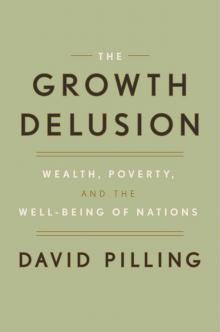 The Growth Delusion
The Growth Delusion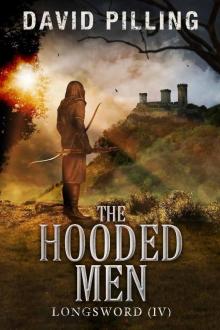 The Hooded Men
The Hooded Men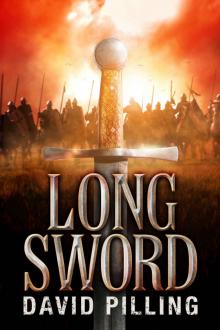 Longsword
Longsword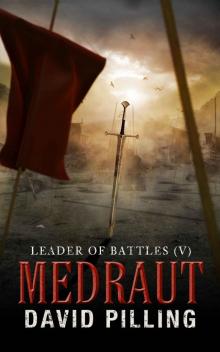 Medraut
Medraut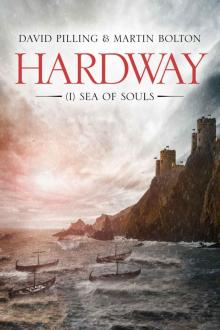 Hardway
Hardway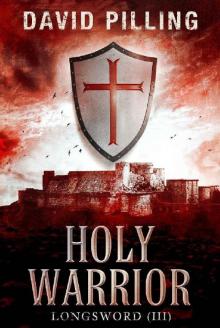 Holy Warrior
Holy Warrior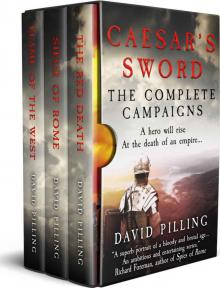 Caesar's Sword: The Complete Campaigns
Caesar's Sword: The Complete Campaigns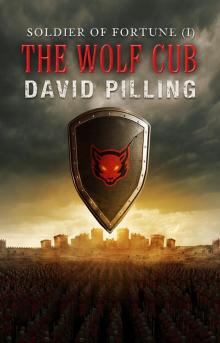 The Wolf Cub
The Wolf Cub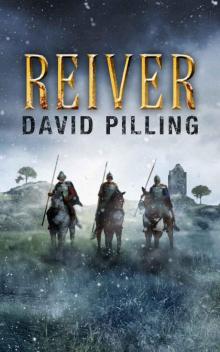 Reiver
Reiver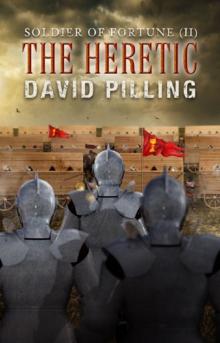 The Heretic
The Heretic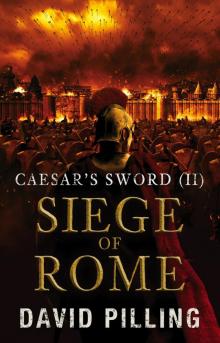 Siege of Rome
Siege of Rome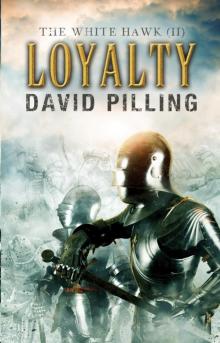 Loyalty
Loyalty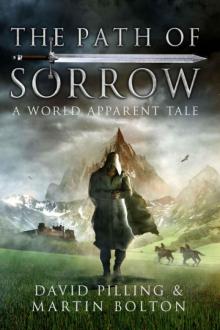 The Path of Sorrow
The Path of Sorrow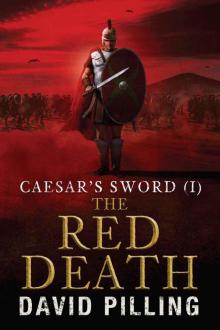 Caesar's Sword (I): The Red Death
Caesar's Sword (I): The Red Death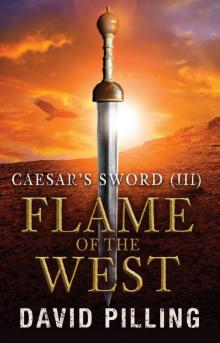 Flame of the West
Flame of the West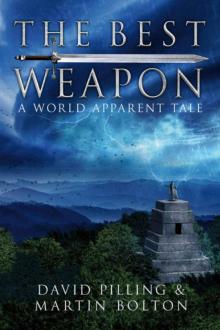 The Best Weapon
The Best Weapon Sacrifice
Sacrifice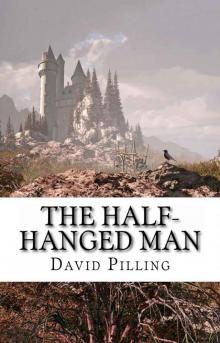 The Half-Hanged Man
The Half-Hanged Man